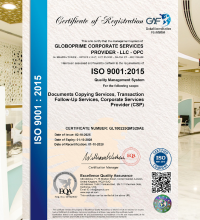Business Setup in Abu Dhabi Free Zone
Abu Dhabi offers a variety of free zones with diverse industry focuses and benefits for businesses . These zones provide a business-friendly environment with 100% foreign ownership, tax exemptions, and streamlined company setup procedures. Are you planning to start your business ? We are here to assist you.
Abu Dhabi Free Zone Business Setup
Abu Dhabi is one of the seven emirates that make up the United Arab Emirates (UAE). It is the largest emirate by area and the second-most populous, with a diverse economy and a growing number of free zones. Free zones are special economic zones that offer a number of benefits to businesses, including 100% foreign ownership, tax exemptions, and simplified company setup procedures. This article will guide you through the process of setting up a business in a free zone in Abu Dhabi.
Benefits of Setting Up a Business in a Free Zone in Abu Dhabi
Key Benefits
- 100% Foreign Ownership: Unlike mainland company setups, free zones allow 100% foreign ownership of companies, giving you complete control over your business without the need for a local partner.
- Tax Exemptions: Enjoy significant tax advantages, including 0% corporate and personal income tax, exemption from VAT, and no import or export taxes. This allows you to maximize profitability and reinvest your earnings into your business growth.
- Simplified Company Setup Procedures: Free zones offer a streamlined and efficient company setup process, with minimal bureaucratic hurdles and faster processing times.
- Strategic Location: Many free zones are strategically located near major transportation hubs, such as ports and airports, providing logistical advantages and easy access to regional and international markets.
- Access to World-Class Infrastructure: Free zones provide state-of-the-art infrastructure, including modern office spaces, well-equipped warehouses, and advanced technology parks.
- Industry-Specific Zones: Abu Dhabi’s free zones cater to various sectors, creating specialized ecosystems where businesses can connect with like-minded companies, fostering collaboration and innovation.
- Business Incubators and Support Services: Abu Dhabi has established business incubators that provide a nurturing environment for startups and entrepreneurs. These incubators offer resources such as mentorship, networking opportunities, access to funding, and business support services to help startups thrive.
- Dual Licensing: Free zone companies can obtain a dual license, allowing them to operate in both the free zone and the mainland. This provides greater flexibility and access to a wider market.
- Comprehensive Support Services: Free zones offer a range of support services to assist businesses, including:
- Assistance with company registration and licensing.
- Visa processing and government relations support.
- Access to business incubators and training programs.
- Advisory services on legal, financial, and operational matters.
- Networking opportunities and industry events.
Potential Limitations
While free zones offer numerous advantages, it’s important to be aware of the potential limitations:- Restrictions on Trading within the UAE: Free zone companies cannot directly trade with the local UAE market. However, they can work with a locally appointed distributor or open branch offices in the UAE to access the mainland market.
Free Zones in Abu Dhabi
Abu Dhabi boasts a variety of free zones, each with its own unique advantages and regulations. These zones are strategically designed to cater to specific industries, fostering growth and attracting foreign investment. Here’s a closer look at some of the prominent free zones in Abu Dhabi:
- Abu Dhabi Global Market (ADGM): This financial free zone serves as an international financial center in Abu Dhabi. It offers a comprehensive platform for businesses in banking, finance, and investment.
- Khalifa Industrial Zone Abu Dhabi (KIZAD)/Khalifa Economic Zone Abu Dhabi (KEZAD): As one of the largest industrial zones in the UAE, KIZAD is strategically located between Abu Dhabi and Dubai. It provides a robust infrastructure and a supportive environment for heavy industries, including metal fabrication, automotive, chemicals, and construction materials.
- Masdar City Free Zone: This free zone focuses on renewable energy and environmental sustainability. It offers a unique ecosystem for companies engaged in clean technology and green initiatives.
- Abu Dhabi Airport Free Zone (ADAFZ): Located near Abu Dhabi International Airport, ADAFZ caters to businesses in the aviation, logistics, freight, cargo, and aerospace industries.
- Twofour54 – Abu Dhabi Media Free Zone: This media and entertainment free zone supports the growth of the media industry in Abu Dhabi. It provides a creative environment and infrastructure for media companies, freelancers, and startups involved in media and content creation.
- Industrial City of Abu Dhabi (ICAD): ICAD focuses on heavy industries, offering excellent infrastructure and proximity to key transportation links. It comprises several clusters dedicated to different industries, including:
- ICAD I: Heavy-to-medium manufacturing, engineering, and processing industries.
- ICAD II: Light-to-medium manufacturing, engineering, and processing industries.
- ICAD III: Light-to-medium manufacturing.
- ICAD IV: Technology and light industries.
- Higher Corporation for Specialized Economic Zones (ZonesCorp): ZonesCorp develops specialized industrial zones, catering to various sectors.
Each free zone has its own specific advantages and regulations, so it’s essential to choose the one that best aligns with your business needs and goals.
Business Structures in Abu Dhabi Free Zones
Abu Dhabi free zones permit various business structures to accommodate diverse needs and investment goals. Here are the main types of entities you can establish:
- Free Zone Limited Liability Company (FZ LLC): This is an independent legal entity that can have one or more shareholders. Shareholders can be individuals or corporate entities. This structure offers flexibility and is suitable for businesses of varying sizes.
- Branch of a Foreign Company: Foreign companies can establish a branch office in Abu Dhabi free zones to extend their operations. This allows them to leverage their existing brand and resources while tapping into the UAE market.
- Free Zone Establishment (FZE): This structure is similar to an FZ LLC but is specifically designed for single-owner businesses. The shareholder can be an individual or a corporate entity.
- Freelance Business: Free zones also provide options for freelancers and independent professionals to operate their businesses with a dedicated license.
When choosing a business entity, consider factors like the number of shareholders, desired ownership structure, and the specific regulations of your chosen free zone. Each structure has its own implications for liability, capital requirements, and operational flexibility.
Process of Setting Up a Business in a Free Zone in Abu Dhabi
Setting up a business in a free zone in Abu Dhabi involves a streamlined process designed for efficiency. Here’s a step-by-step guide to help you navigate the process:
- Select a Business Activity: Identify the specific business activity you wish to conduct. This will determine the type of license you need and the free zone that best suits your business.
- Determine a Legal Structure: Choose a legal structure for your company, such as an FZ LLC, FZ Co., or FZE, based on your business needs and the number of shareholders.
- Propose a Company Name: Select a unique and relevant company name that complies with the free zone’s naming regulations.
- Submit the Application Form: Complete and submit the application form to the free zone authority, along with the required documents.
- Select a Facility for Lease: Choose an office space, warehouse, or land within the free zone that meets your operational requirements.
- Submit Documents: Provide all the necessary documents, including passport copies, business plans, and other relevant paperwork.
- Receive Trade License & Key to the Facility: Once your application is approved, you will receive your trade license and the keys to your chosen facility.
- Apply for Visas: Apply for visas for yourself and your employees, if required.
- Open a Corporate Bank Account: Open a corporate bank account with a UAE bank to manage your business finances.
For a more detailed process, consider the following additional steps:
- Settle company incorporation fees.
- Sign and return the client engagement letter.
- Provide all the required due diligence documents.
- Choose a company name and business activity.
- Select a free zone and company structure.
- Prepare legal documents, including the Memorandum and Articles of Association.
- Notarize and attest the legal documents.
- Submit the application to the free zone authority.
- Obtain the business license.
- Apply for visas and open a corporate bank account.
Required Documents for Business Setup in Abu Dhabi Free Zone
The required documents for setting up a business in an Abu Dhabi Free Zone can vary slightly depending on the specific free zone and the type of business activity. However, here is a general list of the common documents required:
- Application form: A completed application form provided by the free zone authority.
- Passport copies: Clear copies of the passports of all shareholders and directors involved in the company.
- Visa copies: If shareholders or directors are UAE residents, copies of their valid UAE residence visas are required.
- Passport-sized photographs: Recent passport-sized photographs of all shareholders and directors.
- Business plan: A comprehensive business plan outlining the company’s objectives, activities, and financial projections.
- Memorandum of Association (MOA) and Articles of Association (AOA): These documents outline the company’s structure, objectives, and regulations.
- Lease agreement: A copy of the lease agreement for the office space within the free zone.
- No Objection Certificate (NOC): In some cases, an NOC from the current employer of shareholders or directors may be required.
- Proof of address: Documents providing proof of residential address for shareholders and directors.
- Bank reference letter: A reference letter from the shareholder’s or director’s bank confirming their good standing.
Some free zones may require additional documents depending on the specific business activity. For example, companies engaged in certain sectors like media, IT, or pharmaceuticals may need to provide approvals from relevant authorities.
It’s essential to check with the specific free zone authority for their precise document requirements to ensure a smooth and efficient company setup process.
For more details, visit the official Abu Dhabi Free Zone authority websites.
Requirements for Setting Up a Business in a Free Zone in Abu Dhabi
The requirements for setting up a business in a free zone in Abu Dhabi vary depending on the specific free zone and the type of business activity. However, here are some general requirements:
- Choose a Business Activity: Each free zone has a list of permitted business activities. You need to select an activity that aligns with your business goals and is allowed in your chosen free zone.
- Determine the Legal Structure: Choose a legal structure that suits your business needs. The common options include:
- Free Zone Limited Liability Company (FZ LLC)
- Free Zone Company (FZ Co.)
- Free Zone Establishment (FZE)
- Register a Trade Name: Select a unique trade name that complies with the free zone’s naming regulations and is not already registered by another company.
- Legal Considerations: Be aware of the legal requirements, such as:
- Corporate directors are allowed.
- An Abu Dhabi resident company secretary may be required.
- The company can apply for immigration visas.
- Capital Requirements: Depending on the free zone and the chosen corporate structure, the paid-up share capital can range from US$14,000 to US$300,000.
- Obtain Initial Approval: Before proceeding with the setup, you need to obtain initial approval from the free zone authority.
- Choose an Office Space: Secure a physical office space within the free zone. Options include serviced offices, warehouses, or land, depending on your business needs.
- Submit the Required Documents: Gather and submit the necessary documents, which typically include:
- Company application form
- Passport copies of the shareholders
- Passport-size photographs
- Business plan
- Proof of address
- Bank reference letter
- Pay the Required Fees: Pay the required fees for registration, licensing, and other administrative services.
The cost of setting up a business in a free zone in Abu Dhabi can vary based on several factors, including the type of license, office space, and the specific free zone.
Here’s a general overview of the costs involved:
Free Zone Costs
| Free Zone | License Fee (Annually) | Office Space (Annually) | Visa Fees (Per Visa) |
|---|---|---|---|
| Dubai Airport Free Zone (DAFZA) | AED 15,000 – AED 30,000 | AED 20,000 – AED 50,000 | AED 4,000 |
| Ras Al Khaimah Economic Zone (RAKEZ) | AED 10,000 – AED 25,000 | AED 10,000 – AED 40,000 | AED 3,500 |
| Dubai Multi Commodities Centre (DMCC) | AED 15,000 – AED 35,000 | AED 20,000 – AED 60,000 | AED 4,500 |
| Abu Dhabi Global Market (ADGM) | AED 20,000 – AED 40,000 | AED 25,000 – AED 70,000 | AED 5,000 |
| Sharjah Media City (Shams) | AED 10,000 – AED 20,000 | AED 15,000 – AED 30,000 | AED 3,500 |
Additional Expenses
| Cost Component | Estimated Cost |
|---|---|
| Trade Name Registration | AED 620 – AED 1,500 |
| Initial Approval Fees | AED 1,000 – AED 2,500 |
| Licensing Fees (Mainland) | AED 10,000 – AED 25,000 |
| Office Space Rental (if applicable) | AED 15,000 – AED 30,000/year (depending on location) |
It’s important to factor in these costs when planning your budget for setting up a business in Abu Dhabi.
Government Entities Involved in the Process of Setting Up a Business in a Free Zone in Abu Dhabi
Several government agencies play a role in the business setup process in Abu Dhabi’s free zones. Here are some of the key agencies:
- Department of Economic Development (DED): The DED is the primary authority responsible for regulating economic activities in Abu Dhabi. It oversees business licensing, trade name registration, and other aspects of business setup.
- Free Zone Authorities: Each free zone has its own governing authority that manages the zone’s operations, issues licenses, and provides support to businesses. Some of the authorities regulating free zone activities include:
- Abu Dhabi Media Free Zone (Media Zone Authority)
- Masdar City
- Khalifa Industrial Zone Abu Dhabi (KIZAD)
- Abu Dhabi Global Market (ADGM)
- General Directorate of Residency and Foreigners Affairs – Abu Dhabi: This agency handles visa and residency permit applications for foreign investors and employees.
Depending on your business activity, you may also need approvals from other government bodies, such as:
- Abu Dhabi Agriculture and Food Safety Authority (for food and beverage businesses)
- Abu Dhabi Customs Duty
- Abu Dhabi Distribution Company
- Ministry of Civil Aviation
- Telecommunication Regulatory Authority
- Supreme Petroleum Council
- Abu Dhabi Education Council
- Medical Council
- Central Bank
Types of Business Licenses in Abu Dhabi Free Zones
Free zones in Abu Dhabi offer various licenses to accommodate different business activities. Some of the common license types include:
- Commercial License: For businesses engaged in trading and commercial activities.
- Industrial License: For manufacturing and industrial operations.
- Service License: For service-oriented businesses, such as consulting, marketing, and IT services.
- General Trading License: Allows for trading in a wide range of products.
- Specialized Licenses: Cater to specific industries or sectors, such as media, technology, or healthcare.
The technology and innovation sector is particularly thriving in Abu Dhabi, driven by government initiatives like Hub71. This presents lucrative opportunities for businesses in this sector.
Required Documents for Business Setup in Abu Dhabi Free Zone
The required documents for setting up a business in an Abu Dhabi Free Zone can vary slightly depending on the specific free zone and the type of business activity. However, here is a general list of the common documents required:
- Application form: A completed application form provided by the free zone authority.
- Passport copies: Clear copies of the passports of all shareholders and directors involved in the company.
- Visa copies: If shareholders or directors are UAE residents, copies of their valid UAE residence visas are required.
- Passport-sized photographs: Recent passport-sized photographs of all shareholders and directors.
- Business plan: A comprehensive business plan outlining the company’s objectives, activities, and financial projections.
- Memorandum of Association (MOA) and Articles of Association (AOA): These documents outline the company’s structure, objectives, and regulations.
- Lease agreement: A copy of the lease agreement for the office space within the free zone.
- No Objection Certificate (NOC): In some cases, an NOC from the current employer of shareholders or directors may be required.
- Proof of address: Documents providing proof of residential address for shareholders and directors.
- Bank reference letter: A reference letter from the shareholder’s or director’s bank confirming their good standing.
In addition to these common documents, some free zones may require additional documents depending on the specific business activity. For example, companies engaged in sectors like media, IT, or pharmaceuticals may need to provide approvals from relevant authorities. It’s essential to check with the specific free zone authority for their precise document requirements to ensure a smooth and efficient company setup process.





